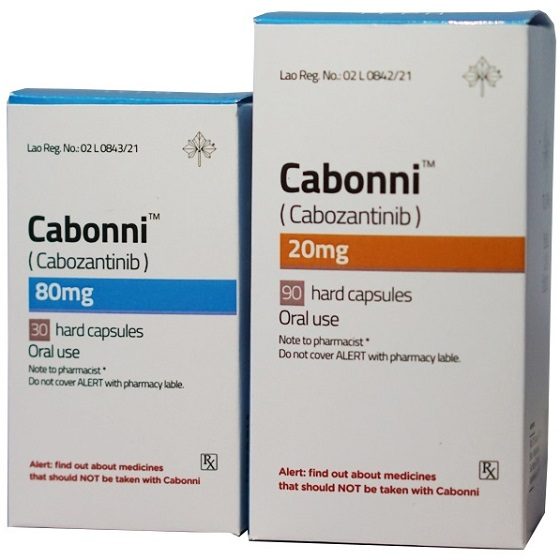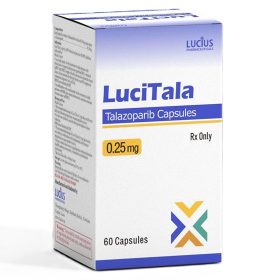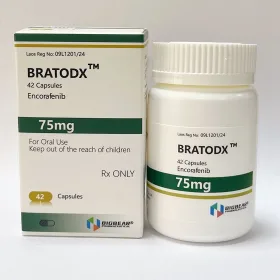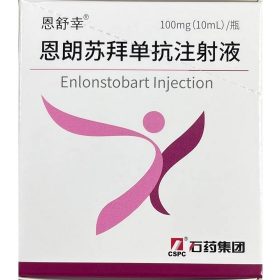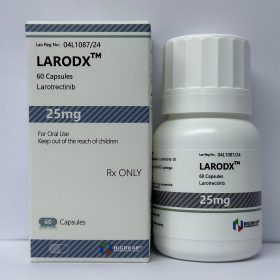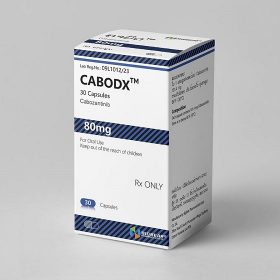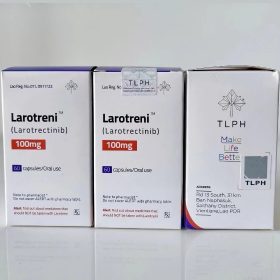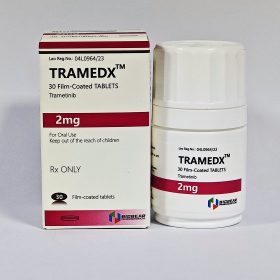- Details
- Description
-
Packaging Size30capsules/bottle
-
Strength80mg
-
CompositonCabozantinib
-
TreatmentTreat medullary thyroid cancer, treat advanced kidney cancer, treat advanced kidney cancer, treat differentiated thyroid cancer
-
FormCapsule
-
BrandCabonni 80
-
Quantity Unit80mg*30capsules/bottle
-
ManufacturerTongmeng (Lao) Pharmaceutical & Food Co., Ltd.(TLPH)
Generic Name: Cabozantinib
Brand Names: Cabonni (Cabozantinib) 80mg.
Dosage form: 80mg x 30Capsules.
Description
Cabonni (Cabozantinib) capsule is used to treat medullary thyroid cancer that has already spread to different parts of the body.
Cabonni (Cabozantinib) tablet is used alone to treat advanced kidney cancer. It is also used in combination with nivolumab as first-line treatment for advanced kidney cancer.
Cabonni (Cabozantinib) tablet is also used to treat a type of liver cancer, called hepatocellular carcinoma, in patients who have been previously treated with other medicines (eg, sorafenib).
Cabonni (Cabozantinib) tablet is also used to treat differentiated thyroid cancer that has already spread to different parts of the body, in patients who can no longer be treated with radioactive iodine or not able to receive radioactive iodine, and have been previously treated with other medicines (eg, VEGFR-targeted treatment) but did not work well.
Cabonni (Cabozantinib) is an antineoplastic (cancer) medicine. It interferes with the growth of cancer cells, which are eventually destroyed by the body.
This medicine is available only with your doctor's prescription.
This product is available in the following dosage forms:
- Capsule
- Tablet
Before Using
In deciding to use a medicine, the risks of taking the medicine must be weighed against the good it will do. This is a decision you and your doctor will make. For this medicine, the following should be considered:
Allergies
Tell your doctor if you have ever had any unusual or allergic reaction to this medicine or any other medicines. Also tell your health care professional if you have any other types of allergies, such as to foods, dyes, preservatives, or animals. For non-prescription products, read the label or package ingredients carefully.
Pediatric
Appropriate studies have not been performed on the relationship of age to the effects of Cabonni (Cabozantinib) in children younger than 12 years of age to treat differentiated thyroid cancer or in children to treat medullary thyroid cancer, liver cancer, and advanced kidney cancer. Safety and efficacy have not been established.
Geriatric
Appropriate studies performed to date have not demonstrated geriatric-specific problems that would limit the usefulness of Cabonni (Cabozantinib) tablets in the elderly.
Appropriate studies have not been performed on the relationship of age to the effects of Cabonni (Cabozantinib) capsules in the geriatric population. However, no geriatric-specific problems have been documented to date.
Breastfeeding
There are no adequate studies in women for determining infant risk when using this medication during breastfeeding. Weigh the potential benefits against the potential risks before taking this medication while breastfeeding.
Drug Interactions
Although certain medicines should not be used together at all, in other cases two different medicines may be used together even if an interaction might occur. In these cases, your doctor may want to change the dose, or other precautions may be necessary. When you are taking this medicine, it is especially important that your healthcare professional know if you are taking any of the medicines listed below. The following interactions have been selected on the basis of their potential significance and are not necessarily all-inclusive.
Using this medicine with any of the following medicines is usually not recommended, but may be required in some cases. If both medicines are prescribed together, your doctor may change the dose or how often you use one or both of the medicines.
- Abametapir
- Apalutamide
- Boceprevir
- Carbamazepine
- Ceritinib
- Clarithromycin
- Cobicistat
- Conivaptan
- Enzalutamide
- Fedratinib
- Fexinidazole
- Fosnetupitant
- Fosphenytoin
- Idelalisib
- Indinavir
- Itraconazole
- Ketoconazole
- Lopinavir
- Lumacaftor
- Mitotane
- Nefazodone
- Nelfinavir
- Netupitant
- Phenytoin
- Posaconazole
- Rifampin
- Ritonavir
- Saquinavir
- St John's Wort
- Telaprevir
- Telithromycin
- Voriconazole
- Warfarin
Other Interactions
Certain medicines should not be used at or around the time of eating food or eating certain types of food since interactions may occur. Using alcohol or tobacco with certain medicines may also cause interactions to occur. The following interactions have been selected on the basis of their potential significance and are not necessarily all-inclusive.
Using this medicine with any of the following is usually not recommended, but may be unavoidable in some cases. If used together, your doctor may change the dose or how often you use this medicine, or give you special instructions about the use of food, alcohol, or tobacco.
- Grapefruit Juice
Other Medical Problems
The presence of other medical problems may affect the use of this medicine. Make sure you tell your doctor if you have any other medical problems, especially:
- Bleeding problems or
- Blood clots or
- Heart attack, acute or
- Hypertension (high blood pressure), uncontrolled or
- Hypocalcemia (low calcium levels in the blood) or
- Hypothyroidism or
- Proteinuria (protein in the urine) or
- Stomach fistula or perforation (a hole in the stomach) or
- Stroke, recent—Use with caution. May make these conditions worse.
- Dental or tooth problems or
- Dental procedures or surgery or
- Poor oral hygiene or
- Tooth infection—May increase risk for severe jaw problems.
- Hematemesis (vomiting of blood), recent or
- Hemoptysis (coughing up blood), recent or
- Hemorrhage (severe bleeding), recent history or
- Melena (black, tarry stools)—Should not be used in patients with these conditions.
- Liver disease, mild or moderate—Use with caution. The effects may be increased because of slower removal of the medicine from the body.
- Liver disease, severe—Use is not recommended in patients with these conditions.
Proper Use
Medicines used to treat cancer are very strong and can have many side effects. Before taking this medicine, make sure you understand all the risks and benefits. It is important for you to work closely with your doctor during your treatment.
Take this medicine only as directed by your doctor. Do not take more of it, do not take it more often, and do not take it for a longer time than your doctor ordered. To do so may increase the chance of unwanted effects.
This medicine comes with a patient information insert. Read and follow the instructions carefully. Ask your doctor if you have any questions.
Do not substitute Cabonni tablets with cabozantinib capsules. Do not substitute Cabonni capsules with cabozantinib tablets.
Take this medicine on an empty stomach. Do not eat for at least 2 hours before and at least 1 hour after taking this medicine.
Swallow the medicine whole with a full glass (at least 8 ounces) of water. Do not crush, break, chew, or open the capsule or tablet.
Do not eat grapefruit or drink grapefruit juice while you are using this medicine. Grapefruit and grapefruit juice may increase the amount of this medicine in the blood.
Dosing
The dose of this medicine will be different for different patients. Follow your doctor's orders or the directions on the label. The following information includes only the average doses of this medicine. If your dose is different, do not change it unless your doctor tells you to do so.
The amount of medicine that you take depends on the strength of the medicine. Also, the number of doses you take each day, the time allowed between doses, and the length of time you take the medicine depend on the medical problem for which you are using the medicine.
- For oral dosage form (capsules):
- For thyroid cancer:
- Adults—140 milligrams (mg) (one 80 mg and three 20 mg capsules) per day as a single dose. Your doctor may adjust the dose as needed.
- Children—Use and dose must be determined by your doctor.
- For thyroid cancer:
- For oral dosage form (tablets):
- For advanced kidney cancer:
- Adults—60 milligrams (mg) once a day. Your doctor may adjust the dose as needed and tolerated.
- Children—Use and dose must be determined by your doctor.
- For advanced kidney cancer in combination with nivolumab:
- Adults—40 milligrams (mg) once a day. Your doctor may adjust the dose as needed and tolerated.
- Children—Use and dose must be determined by your doctor.
- For hepatocellular carcinoma:
- Adults—60 milligrams (mg) once a day. Your doctor may adjust the dose as needed and tolerated.
- Children—Use and dose must be determined by your doctor.
- For thyroid cancer:
- Adults and children 12 years of age and older—Dose is based on body surface area (BSA) and must be determined by your doctor.
- BSA of 1.2 meter squared (m2) or more—60 milligrams (mg) once a day. Your doctor may adjust your dose as needed and tolerated.
- BSA of less than 1.2 m2—40 mg once a day. Your doctor may adjust your dose as needed and tolerated.
- Children younger than 12 years of age—Use and dose must be determined by your doctor.
- Adults and children 12 years of age and older—Dose is based on body surface area (BSA) and must be determined by your doctor.
- For advanced kidney cancer:
Missed Dose
If you miss a dose of this medicine, take it as soon as possible. However, if it is almost time for your next dose, skip the missed dose and go back to your regular dosing schedule. Do not double doses.
If you miss a dose of this medicine and it is less than 12 hours until your next scheduled dose, skip the missed dose and take your next dose at the normal time. If you miss a dose and it is more than 12 hours until your next dose, take it as soon as possible and take your next dose at the normal time.
Storage
Store the medicine in a closed container at room temperature, away from heat, moisture, and direct light. Keep from freezing.
Keep out of the reach of children.
Do not keep outdated medicine or medicine no longer needed.
Ask your healthcare professional how you should dispose of any medicine you do not use.
Precautions
It is very important that your doctor check your progress at regular visits to make sure this medicine is working properly. Blood and urine tests may be needed to check for unwanted effects.
Using this medicine while you are pregnant can harm your unborn baby. If you are a woman who can get pregnant, you doctor may do tests to make sure you are not pregnant before starting treatment. You should continue to use birth control during treatment with this medicine and for at least 4 months after the last dose to keep from getting pregnant. If you think you have become pregnant while using the medicine, tell your doctor right away.
Check with your doctor right away if you have severe stomach pain, gagging, coughing, or choking when you eat or drink. These could be symptoms of a perforation (tear) or fistula (hole) in the bowel.
This medicine may increase your risk of bleeding. Tell your doctor right away if you cough up blood or have bleeding gums, difficulty with breathing or swallowing, dizziness, increased menstrual flow or vaginal bleeding, nosebleeds, prolonged bleeding from cuts, red or dark brown urine, or red or black, tarry stools. Stay away from rough sports or other situations where you could be bruised, cut, or injured. Brush and floss your teeth gently. Be careful when using sharp objects, including razors and fingernail clippers.
This medicine may increase your risk of developing blood clots. Check with your doctor right away if you have swelling and pain in your arms, legs, or stomach, chest pain, difficulty with breathing, loss of sensation, confusion, or problems with muscle control or speech.
Check with your doctor right away if you have chest pain or discomfort, nausea, pain or discomfort in your arms, jaw, back, or neck, sweating, or vomiting. These could be symptoms of a heart attack.
Make sure any doctor or dentist who treats you knows that you are using this medicine. You may need to stop using this medicine at least 3 weeks before having surgery, including dental procedures. Wait for at least 2 weeks after major surgery, or until adequate wound healing before taking this medicine again.
Your doctor will check your blood pressure on a regular basis while you are using this medicine. You might need to monitor your blood pressure at home. Tell your doctor right away if you have a severe headache, lightheadedness, or changes in your vision.
Tell your doctor right away if you have jaw tightness, swelling, numbness, pain, or a loose tooth. This could be symptoms of a severe jaw problem.
This medicine may cause a serious skin problem called hand-foot syndrome or palmar plantar erythrodysesthesia syndrome. Check with your doctor if you have a rash that does not go away or redness, pain, swelling, or blisters on the palms of your hands or soles of your feet.
Check with your doctor right away if you have dark urine, clay-colored stools, stomach pain, or yellow eyes or skin. These may be symptoms of a serious liver problem.
This medicine may cause adrenal gland problems. Check with your doctor right away if you have darkening of the skin, diarrhea, dizziness, fainting, loss of appetite, mental depression, nausea, skin rash, unusual tiredness or weakness, or vomiting.
Check with your doctor right away if you have a headache, seizures, confusion, blurred vision or other visual problems. These may be symptoms of a rare and serious brain condition called reversible posterior leukoencephalopathy syndrome.
This medicine may cause hypocalcemia (low calcium in the blood). Check with your doctor right away if you have confusion, difficulty in breathing, irregular heartbeats, mood or mental changes, muscle cramps in the hands, arms, feet, or face, numbness and tingling around the mouth, fingertips, or feet, seizures, stomach cramps, tremor, or trouble breathing.
Talk with your doctor before using this medicine if you plan to have children. Some men and women who use this medicine have become infertile (unable to have children).
Do not take other medicines unless they have been discussed with your doctor. This includes prescription or nonprescription (over-the-counter [OTC]) medicines and herbal (eg, St. John's wort) or vitamin supplements.
Side Effects
Along with its needed effects, a medicine may cause some unwanted effects. Although not all of these side effects may occur, if they do occur they may need medical attention.
Check with your doctor immediately if any of the following side effects occur:
More common
- Blurred vision
- burning, numbness, tingling, or painful sensations
- confusion
- constipation
- dark urine
- darkening of the skin
- decreased urination
- diarrhea
- difficulty with breathing or swallowing
- dizziness
- dry mouth
- dry skin and hair
- fainting
- feeling cold
- hair loss
- headache
- hoarseness or husky voice
- increase in heart rate
- lightheadedness
- loss of appetite
- mental depression
- muscle cramps, spasms, and stiffness
- nausea or vomiting
- nervousness
- pain in the chest, groin, or legs, especially the calves
- pounding in the ears
- rapid breathing
- redness, swelling, or pain of the skin
- scaling of the skin on the hands and feet
- severe, sudden headache
- skin rash or ulcers
- slow or fast heartbeat
- slurred speech
- stomach pain
- sudden loss of coordination
- sudden, severe weakness or numbness in the arm or leg
- sunken eyes
- thirst
- unsteadiness or awkwardness
- unusual tiredness or weakness
- vision changes
- weakness in the arms, hands, legs, or feet
- weight gain
- wrinkled skin
- yellow eyes or skin
Less common
- Bleeding gums
- bloody, black, or tarry stools
- coughing up blood
- heartburn
- heavy jaw feeling
- increased menstrual flow or vaginal bleeding
- indigestion
- loosening of a tooth
- mood or mental changes
- muscle cramps in the hands, arms, feet, legs, or face
- nosebleeds
- numbness and tingling around the mouth, fingertips, or feet
- pain, swelling, or numbness in the mouth or jaw
- paralysis
- prolonged bleeding from cuts
- red or dark brown urine
- seizures
- severe stomach pain, cramping, or burning
- tremor
- trouble breathing
- vomiting of material that looks like coffee grounds, severe and continuing
Rare
- Disturbed color perception
- double vision
- halos around lights
- night blindness
- overbright appearance of lights
- tunnel vision
Some side effects may occur that usually do not need medical attention. These side effects may go away during treatment as your body adjusts to the medicine. Also, your health care professional may be able to tell you about ways to prevent or reduce some of these side effects. Check with your health care professional if any of the following side effects continue or are bothersome or if you have any questions about them:
More common
- Belching
- bleeding after defecation
- change in taste
- changes in hair color
- decreased appetite
- decreased weight
- difficulty having a bowel movement
- difficulty with moving
- fear
- lack or loss of strength
- loss of taste
- muscle pain
- pain in the joints
- rash
- sore throat
- stomach discomfort, upset, or pain
- swelling or inflammation of the mouth
- uncomfortable swelling around the anus
- voice changes

